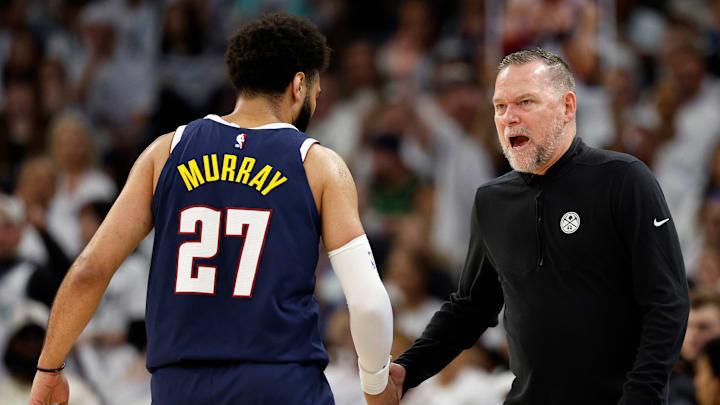All things considered, it was another very fruitful season for the Denver Nuggets, and yet it will seem incredibly disappointing given the type of ceiling this group has. One year removed from a championship, many thought the Nuggets had a solid chance of becoming the first NBA team to win back-to-back titles since 2018. With such a dominant player as Nikola Jokic at the center of everything, a potential dynasty was on the way.
But rather than coast through the second half of the regular season like they did in 2022-23, the Nuggets were forced to fight tooth and nail for the top seed in the Western Conference all the way up until the final day of the regular season. Losing a tiebreaker to the Oklahoma City Thunder, Denver wound up on the same side of the bracket of the Minnesota Timberwolves.
At the end of the day, this circumstance was clearly never a death sentence. Members of the Nuggets' championship squad like Bruce Brown acknowledged that the Wolves presented their toughest challenge in 2023, but they were still rightly confident in their ability to take down Minnesota.
Denver-Minnesota was a coin flip series
Denver won three games in a row against the talented Timberwolves, including two straight on their opponent's home floor. The Nuggets were knocking on the doorstep of advancing to another Western Conference Finals, but they simply ran out of gas.
Some of this result can be attributed to the way Denver had to push all the way to the finish line in the regular season to secure a top-two seed. With less rest than the previous year, they were not as fresh in going up against a high-level opponent like Minnesota.
In the end, Denver came up just short against a team built specifically to take them down. Truly, the Nuggets should find some sort of solace in this result given the circumstances. But at the same time, it is important to look inward and analyze what went wrong in the team's process outside of what happened between the lines on the court.
In an article from NBA Insider Kevin O'Connor, he details how a disagreement between Head Coach Michael Malone and General Manager Calvin Booth played into the season ending the way it did. According to O'Connor, Malone was fixated on doing everything he could to help the team go back-to-back, while Booth was more content making long-term plays.
Differing priorities from Malone and Booth led to season result
“I just want dudes that we try to develop, and it’s sustainable,” Booth said before the season. “If it costs us the chance to win a championship this year, so be it. It’s worth the investment. It’s more about winning three out of six, three out of seven, four out of eight than it is about trying to go back-to-back.”
In a way, Calvin's strategy makes a lot of sense. You had already established that this core of players was championship-worthy, so planning things out for the future was a good play. You could pour all your efforts into winning now, but if your short-term moves end up being short-sighted or do not pan out for another reason, there is no guarantee you could win multiple titles in such a competitive Western Conference.
Putting pieces in place for years down the road was always the wiser move. Of course, plenty of fans will feel like this season was a missed opportunity, and certainly it was without another championship. But not going back-to-back does not exclude the Nuggets from dynasty status. The Tim Duncan-led Spurs won five titles, including three in a five-year span, all because they followed a similar plan to Booth's.
Many would consider the 2000s Spurs as one of the greatest runs of success in modern NBA history. With an unselfish superstar much akin to Duncan at the center of their greatness, Denver still has a chance to achieve a rare level of success by making smart moves and playing the long game.
